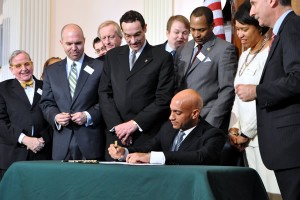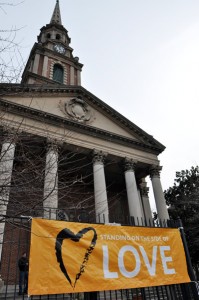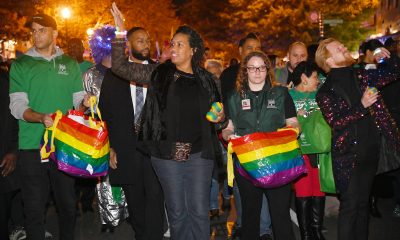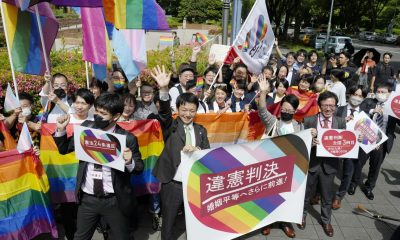Local
An early holiday gift for city’s gay couples
With about 200 spectators cheering from the pews, D.C. Mayor Adrian Fenty signed a bill last week to legalize same-sex marriage in Washington during a ceremony at a church that played a leading role in pushing for black civil rights in the 1950s and 1960s.
“To the world, today an era of struggle ends for thousands of residents of Washington, D.C., who have been denied the fundamental right to marry the person of their choosing,” Fenty told the gathering at All Souls Unitarian Church in Northwest D.C.
“I say to all those residents who watch the nation’s capital today that our city is taking a leap forward in ensuring freedom and equality to all residents.”
Fenty signed the Religious Freedom & Civil Marriage Equality Amendment Act of 2009 four days after the D.C. Council gave its final approval of the measure, 11-2.
The signing also came five months after a separate bill passed by the Council and signed by Fenty, which recognizes same-sex marriages performed in other jurisdictions, became law after clearing its required congressional review.
The measure that Fenty signed Friday was expected to be sent to Capitol Hill this week, where it, too, must undergo a congressional review of 30 legislative days. Most congressional observers expect the Democratic controlled Congress will allow the bill to become law by taking no legislative action to overturn it.
“The signing of this bill marks a watershed moment for human rights in the District of Columbia,” said Rev. Robert Hardies, pastor of All Souls Unitarian Church and one of the leaders of a coalition of D.C. clergy members who support same-sex marriage equality.
“I and the nearly 200 D.C. clergy who supported this bill look forward to celebrating the marriages of loving lesbian and gay couples in sanctuaries like this one all over our city,” he said.
Among those standing behind Fenty as he signed the bill at a table set up in front of the church alter were D.C. Council Chair Vincent Gray (D-At Large); gay Council member David Catania (I-At Large), author and lead sponsor of the bill; and Council member Phil Mendelson (D-At Large), chair of the committee that shepherded the bill through the Council.
Also standing at the table for the signing were gay Council member Jim Graham (D-Ward 1), in whose ward the church is located; Council members Jack Evans (D-Ward 1); Muriel Bowser (D-Ward 4), and Harry Thomas Jr. (D-Ward 5); and Fenty’s LGBT Affairs Office director, Christopher Dyer.
Fenty and Catania, among others participating in the bill signing ceremony, said the decision to hold the event in a church was symbolic of the message they sought to project during the campaign to legalize same-sex marriage in the city: that the legislation would not infringe on the rights of people of faith and would, in fact, give ministers supportive of marriage equality the right to legally perform same-sex marriages.
Most of the opposition to the legislation was led by clergy who oppose same-sex marriage on religious grounds. Bishop Harry Jackson, pastor of Hope Christian Church in Beltsville, Md., and the lead spokesperson for the bill’s opponents, has vowed to continue efforts to urge Congress to overturn the legislation.
Jackson and his supporters also are appealing in D.C. Superior Court a ruling by the city’s election board denying a proposed voter initiative that sought to ban same-sex marriage in the District of Columbia.
Catania told people gathered for the bill’s signing that six generations of his family, including his grandfather, have been Baptist ministers. He noted that leaders of the churches in which his ancestors were a part were outspoken abolitionists in the fight against slavery prior to the Civil War.
“I was raised in a household that loved this country,” he said. “And at times, even in our struggles, we wonder whether our best days are behind us. I have to be completely honest with you. I’ve never been more certain in my life that our best days are before us.”
Catania said the passage and signing of a same-sex marriage bill was the culmination of years of work from committed LGBT activists and their allies, beginning with veteran D.C. gay activist Frank Kameny, who is credited with founding the local LGBT rights movement in the early 1960s.
“I was fortunate enough to simply guide the process and draft [the bill], but it would not have taken place without the extraordinary leadership of Phil Mendelson on the Judiciary Committee and our non-stop support from our [Council] chairman. And enough cannot be said about the rank and file members of this Council, who stood with us.”
Sources familiar with the mayor’s office said Fenty also considered holding the signing ceremony at Covenant Baptist church in
Southeast D.C., which is headed by pro-same-sex marriage pastors Dennis and Christine Wiley. The Wileys, along with Hardies of All Souls, were co-chairs of the coalition of clergy backing same-sex marriage. One source, speaking on condition of anonymity, said Fenty is thought to have chosen All Souls in part because it’s located in the neighborhood where he grew up.
In his remarks, Fenty introduced his parents, who were in the audience, and noted that their status as an interracial couple made them a part of the marriage equality movement.
“My parents know a little something about marriage equality,” he said. “They married almost 40 years ago and in a country at the time where every jurisdiction didn’t agree that an interracial couple should be married. Had they not been able to, I would not be standing here as mayor of the District of Columbia right now.”
Graham, who, along with Catania, has been a longtime LGBT rights advocate, appeared to express the emotion that many LGBT activists and same-sex couples present at the bill signing event shared.
“Thank God for this day,” he said. “Thank God that I was able to live to see this day.”
Graham praised Fenty for standing out as a “certainty” that the bill would be signed whenever the Council felt the time was right to pass it.
He also pointed to the historic support All Souls Unitarian Church provided for the African American civil rights movement in the 1950s, when the church founded one of the city’s first integrated youth clubs. It was at a time when D.C.’s youth recreation facilities were segregated among black and whites.
“We can’t overlook how fitting it is that we are in this church,” he said, “because this church has a great tradition of fighting for civil rights and human rights.”
Fenty, Catania and Graham were beseeched after the ceremony by activists and same-sex couples attending the event who asked them to pose for pictures with them and to sign copies of a mayoral press statement announcing the bill signing.
“It’s an exciting day for many of us,” said gay Democratic activist Peter Rosenstein, one of the organizers of the same-sex marriage advocacy group Campaign for All D.C. Families. “It’s a day that many of us thought wouldn’t come in our lifetimes. It’s for us and for future generations.”
Michael Crawford, co-chair of D.C. for Marriage, said he doesn’t believe Fenty and the 11 Council members who voted for the bill would face serious opposition in their upcoming elections over this specific issue.
“The folks who are claiming they will enact political retribution against Council members that voted for marriage equality, by and large, don’t live in the District,” he said. “So it’s going to be pretty difficult for them to have an impact on District elections.”
Rev. Abena McCray, pastor of D.C.’s LGBT welcoming Unity Fellowship Church, and Bishop Rainey Cheeks, pastor of the city’s Inner Light Ministries, which also has a largely LGBT congregation, each said the mayor’s signing of the marriage bill would boost the faith and morale of LGBT people of faith.
“I don’t anticipate a backlash,” McCray said, when asked about clergy who have opposed the bill.
“God is in control,” she said. “God spoke today. History was made. And we’re going to move forward in only one thing, and that’s love.”
Cheeks said he expects efforts by people of faith to fight the legislation will be diminished once they understand it.
“When they really understand that this law does not take away anything from anybody, it adds to,” they will be far less likely to try to reverse the law, he said.
“Every church and every denomination already has the right to say no to whomever they want to say no to,” Cheeks said, on the question of performing same-sex marriages. “It simply expands the right for us to be able to do what we need to do.”
Virginia
Gay talk show host wins GOP nom for Va. lieutenant guv
John Reid becomes first out gay nominee for statewide office in state
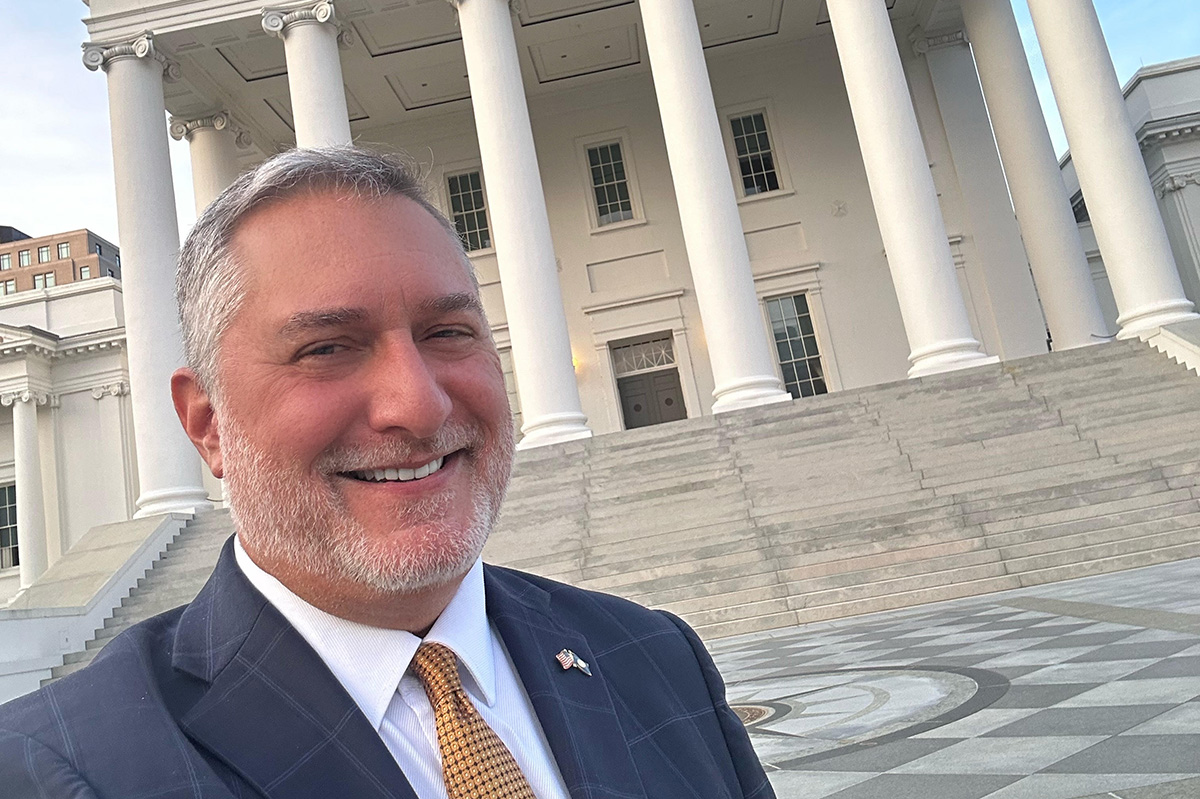
John Reid, a conservative gay radio talk show host in Richmond for many years, this week secured the Republican nomination for the office of lieutenant governor in Virginia, becoming the first known openly gay person to be nominated for a statewide office in that state.
Reid secured the nomination after his only rival in the Republican primary, Fairfax County Supervisor Pat Herrity, dropped out of the race this week for health reasons.
Herrity’s decision to withdraw from the race finalized the GOP nominees for Virginia’s three statewide contests in the November general election in what political observers are calling an unusually diverse GOP slate.
Current Virginia Lt. Gov. Winsome Earle-Sears, a Black woman, captured the GOP nomination for governor without a GOP opponent. Jason S. Miyares, a Hispanic man, is running for re-election as Virginia attorney general without a GOP rival. And Reid, a gay man, is the GOP nominee for lieutenant governor.
Reid will face one of six Democratic candidates for lieutenant governor who are competing in the June 17 Democratic primary.
The Blade spoke with Reid on Tuesday. Below is a partial transcript of that interview.
Blade: Is there a message you have for LGBTQ voters in Virginia, including Democrats, for why you think they should vote for you?
Reid: Well, the thing that I would say to gay voters who are looking and examining the candidates, is that I was out of the closet as a gay Republican publicly in very difficult rooms where people weren’t accepting of gay men – long before Donald Trump said I don’t care about this stuff.
And long before polite society said this was OK. So, in the ‘90s I came out on television and said on Oct. 11 – it was on National Coming Out Day. It was probably in 1996 or 1997. I started at the TV station in 1994. So, it was a couple of years into it.
I came out and said you never know your news anchor could be gay on National Coming Out Day. And everyone was appalled. How can you say this? You’re not supposed to say something like that. So even though I’m a Republican I know some people in the LGBT community are reflexively hostile to Republicans.
I took that step in public, and I think I helped change a lot of minds within the Republican Party and within central Virginia, which continues to be a pretty conservative place by being true to who I am. I spoke out in meetings around Republican staff and legislators and said I think we are not doing the right thing by being hostile to gay marriage.
We talk about the importance of family – Republicans talk about the importance of family, the importance of marriage as a fundamental building block of society. And a gay marriage is a net positive. Is it biblical to people who are following traditional Christian theology? No. But is it good for our society to have people in committed relationships? I think yes.
When we were going through the debate over gays in the military I said I see no reason that someone who is qualified to be in the military and can meet every single standard that everyone else is asked to meet, why should they not be in the Naval Academy, the Air Force Academy, West Point? Or serving as a grunt in active duty. Why would we exclude those people?
And those were very unpopular positions within the Republican Party.
Blade: Your campaign website says you have supported civil unions for same-sex couples. I could have missed seeing it, but I didn’t see an expression of support for gay marriage. Are you saying now that you support full same-sex marriage?
Reid: You know, you’re right. There is a distinction. And I think marriage is completely legitimate. Civil unions – if you want to go and sign paperwork at the courthouse – that’s great. If you want to be married and if a church wants to marry you if you find a church and religious leader and group that wants to bless that – that’s what I hope to do with my partner now.
Sometime in the near future I hope we will be married. And it’s very important to me as a Christian to be married in a church. So, that’s interesting. Most people would not draw that distinction. I appreciate that you’re drawing a distinction. I’m supportive of both.
Blade: Did you say you worked for a member of Congress? Can you say who that was?
Reid: George Allen, the senator from Virginia. And, of course, you and I – I know you’ve covered so many stories like this that you’ve brought together. But it was a very difficult position. When I started with Sen. Allen, he had a very libertarian attitude about this. The [Virginia State] constitutional amendment was not necessary. There was no need to go down that road.
And of course President Bush – George W. – was very assertive during the 2004 campaign. And then the issue continued to bubble up and you know we wound up with this amendment in the Virginia Constitution that banned gay marriage until the Supreme Court decision. And I was not supportive of that. And I voted for my boss, my senator, who I respected and still do respect.
Blade: Your website shows that your support for the gay community does not extend to the transgender community.
Reid: Yeah, I hate this. But I do think that our current focus on trans issues is where the gay rights movement has jumped the shark. And I think we’re losing support that we worked very diligently for decades to build with the average person. And I’m puzzled that the former leaders of the Human Rights Campaign had presidents when Elizabeth Birch and others – I don’t know what their stance is today.
I do recall that all of us who talked about gay rights issues focused on normalcy and that we would meet every standard that everyone else met. That all the vile things that were said about gays being pedophiles and grooming children – that simply was not true.
And I think we have stumbled into a very unfortunate and dangerous territory where we’re almost taunting the average person with an insistence that they accept drag queen story hour and the provocative books and provocative media that the average person would say, ‘You told us you were normal. – quote unquote normal – and now you are peddling an agenda which we don’t agree with and you’re being really aggressive about it.
And that’s really a difference. I know you’ve been covering it for a long time. I don’t know if you agree with this. I think we are peddling a very different political agenda today than the gay community was 20 years ago. And I think we should restrain ourselves and be cautious about that. And I think we’re in dangerous territory with the general population. And I’d urge caution about that.
Blade: Online reports show that there are as many as six Democratic candidates competing for the lieutenant governor’s position in the June 17 Democratic primary. Do you know any of them?
Reid: I’m familiar with most of them. Some are from the Richmond area. And I believe they are all very supportive of gay rights, which is I think a good thing. My reason for challenging them as a Republican – and I think there are other places where there is a lack of appropriate leadership and good judgment. And so, I don’t expect the gay issue would be a real issue. The trans issue may be a point of contention in the race.
But I don’t think the gay issue – and I do draw a distinction between the two — I don’t think that will be a real dividing line with those Democrat[ic] candidates.
Blade: So unlike when you were a TV news anchor, on your radio talk show were you able to offer more opinions and commentary?
Reid: That’s correct. There was a lot of opining, no script. So, I was able to tell stories about how I traveled to Miami, and I went to Washington. I went to the Kennedy Center and shared some of my life and lifestyle as appropriate with the audience.
Blade: Well, thank you for this interview.
Reid: I’m happy to talk to you. One of the reasons I called you back is that the political consultants have always told me don’t talk to anybody that might disagree with you. And I reject that. I have already lived 30 years as an out gay man. And it has been very difficult. And I would like to make it easier for the next generation to live their authentic selves. … Calling you and talking to you against the advice of all these people who say never do that, I’m hopeful that my willingness to engage and be candid will ultimately be well received, I hope.
District of Columbia
New DC LGBTQ Center to celebrate grand opening
Permanent location in Shaw debuts with Saturday celebration
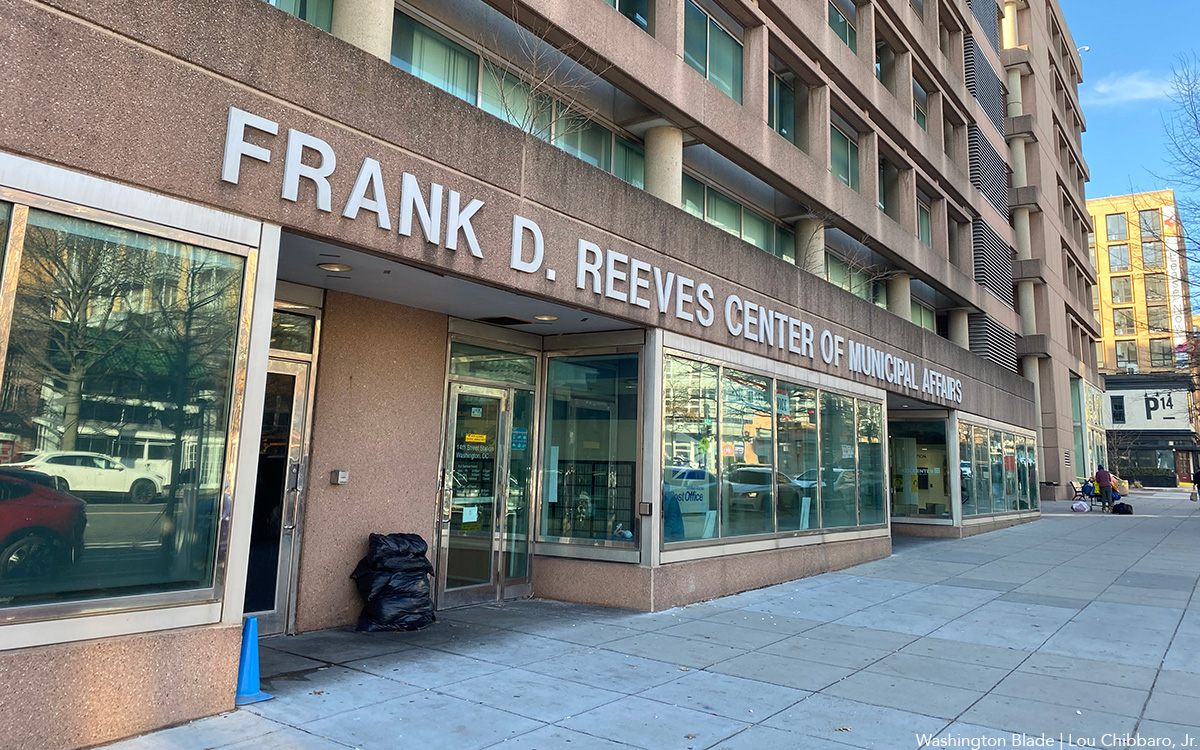
After more than 20 months of demolition, construction, and development, Washington finally has a brand new LGBTQ Center. On Saturday, April 26, the doors will officially open at the DC LGBTQ Center for the first time following the groundbreaking in June 2023.
The new DC LGBTQ Center, located one block from the Shaw Metro station, aims to educate, empower, uplift and celebrate Washington’s LGBTQ community. Spanning 6,671 square feet of intentionally designed space, the center will offer a wide range of resources for LGBTQ individuals in need – including mental health services, job readiness programs, cultural events and community support groups, all under one roof.
The space, located in The Adora building at 1828 Wiltberger St, N.W., has a food pantry, STD and HIV testing space, therapy room, boutique with a clothing closet, an ADA-accessible shower, a mailroom to help those without an address receive mail, and a large kitchen.
The new DC LGBTQ Center will also house office space for nine local LGBTQ organizations. Groups like SMYAL, which supports and uplifts LGBTQ youth, and the Wanda Alston Foundation, which provides transitional housing and support services for homeless or at-risk LGBTQ youth, are central to the center’s mission: to educate, empower, uplift, celebrate, elevate and connect Washington’s LGBTQ community. The center will also become the new home of the Capital Pride Alliance, the organization behind Capital Pride and this year’s WorldPride celebration.
The Reeves Center, the former home of the DC LGBTQ Center, is slated for redevelopment. Located at 14th and U streets, N.W., the building is expected to become a mixed-use hub featuring the NAACP’s national headquarters, a hotel, restaurant, comedy club, housing and more.
On Saturday, the new DC LGBTQ Center will celebrate its grand opening with a full day of events designed to showcase the space’s potential and mark its long-awaited return. The “Friends & Family Day” celebration begins with a brunch at 10 a.m., followed by an open house featuring tours, team introductions, and a look at how the center came to life. The day concludes with a “Honey, I’m Home” cocktail celebration at 5 p.m.
Some events are open to the public, while others, such as the brunch, require an RSVP. To RSVP, visit this link or email [email protected] with any questions.
Virginia
EXCLUSIVE: HRC PAC to endorse Spanberger for Va. governor
Former congresswoman to face off against state’s GOP lieutenant governor
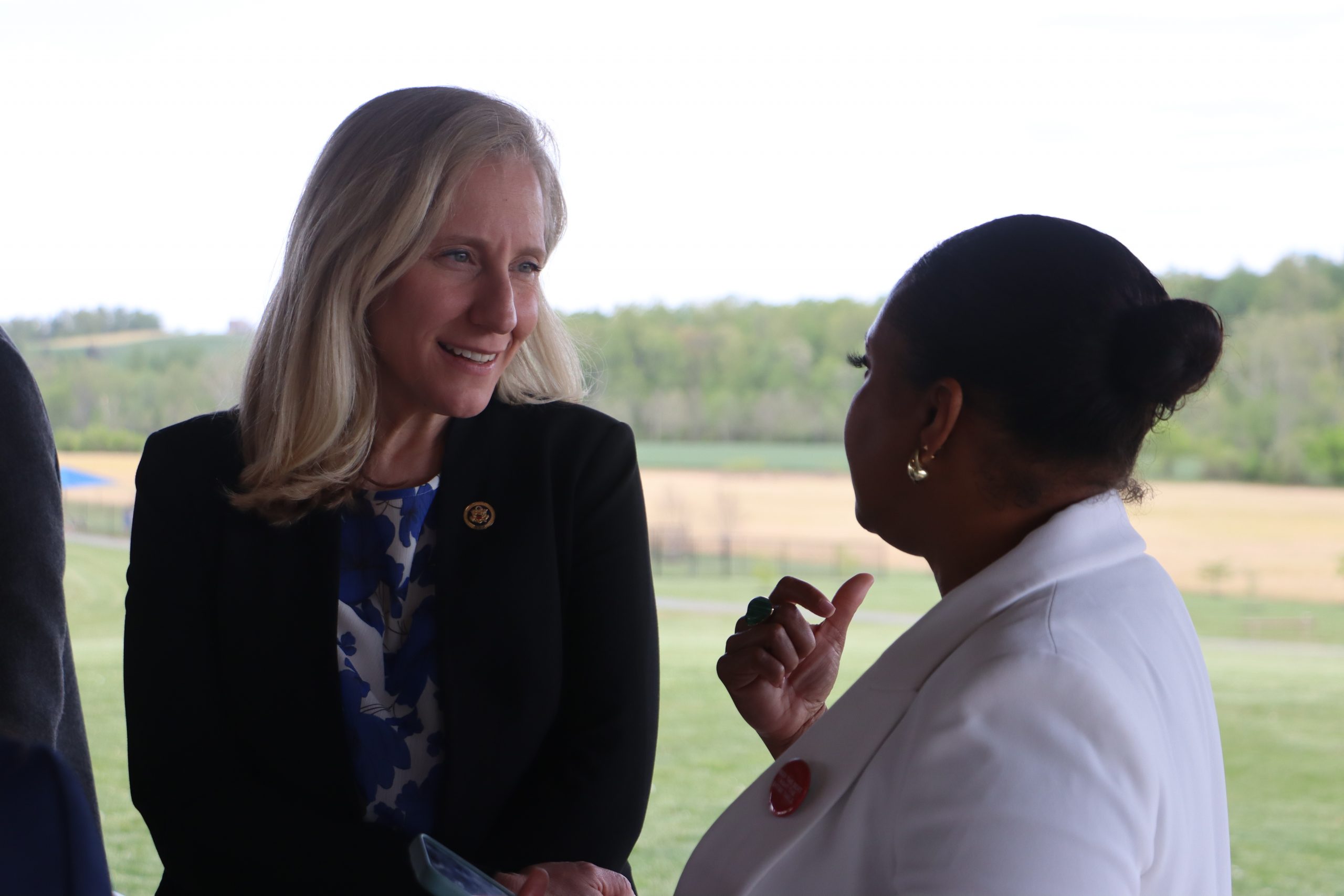
The Human Rights Campaign PAC on Tuesday will endorse Democratic nominee Abigail Spanberger’s run for governor of Virginia, the organization told the Washington Blade.
The former CIA agent-turned-congresswoman, who represented her state’s 7th Congressional District from 2019 to 2025, will face off against Republican Lieutenant Gov. Winsome Earle-Sears in this year’s gubernatorial race.
A Roanoke College survey in February found Spanberger in the lead with a comfortable margin, 39-24, while a trio of polls in January found her ahead by one, five, and 10 percentage points.
Virginia’s incumbent Republican Gov. Glenn Youngkin, who is prohibited from seeking a second term under the state’s constitution, has consistently restricted LGBTQ rights and attacked the transgender community since taking office in 2022.
HRC said Spanberger’s candidacy “offers Virginians renewed hope for a future rooted in equality,” with the group’s president, Kelley Robinson, calling her “a champion for the LGBTQ community.”
Noting the former congresswoman’s co-sponsorship of the Equality Act, legislation that would expand federal anti-discrimination protections to include LGBTQ people, Robinson said Spanberger “understands that Virginia’s future success depends on the full inclusion and protection of all its people.”
HRC’s president added, “As governor, she will work tirelessly to build a Virginia where everyone — regardless of who they are or who they love — can live, work, and go to school with dignity, safety, and opportunity. We are thrilled to support her and mobilize pro-equality Virginians to make her the commonwealth’s next governor.”
Responding to news of the endorsement, Spanberger said “I’m honored to earn the endorsement of the Human Rights Campaign, and I’m ready to work together to build on the progress we’ve made to secure equal protections for all Virginians under the law.”
“Affirming that Virginia is a welcoming home for all families goes beyond protecting marriage equality — it means defending Virginians’ right to live without fear of discrimination or harm,” she said. “As governor, I will work to make sure that no Virginian is denied government services, loses a job, or faces any other form of discrimination because of who they love or who they are.”
HRC further noted that Spanberger fought to pass the Respect for Marriage Act, which was signed into law in 2022 and codified legal protections for married same-sex and interracial couples, as well as her promise to “defend marriage equality and work with the General Assembly to enshrine marriage equality in Virginia’s constitution.”
Spanberger has also committed to “signing legislation guaranteeing Virginians’ right to access contraception and birth control,” HRC wrote, “and protecting against attempts by extreme judges and politicians to roll back Virginians’ reproductive freedoms.”
By contrast, the organization criticized Sears’s LGBTQ rights record — noting that in 2004, she pledged to “emphatically support a constitutional amendment” banning same-sex marriage, in 2021, she campaigned with a gubernatorial candidate who said homosexuality was the “work of the devil,” and in 2022, she “dodged questions” about her position on marriage equality and “attempted to rewrite her hateful history.”
Since 1977, with only one exception, Virginia has elected governors who belong to the party that is out of power at the presidential level. The state’s upcoming off-year gubernatorial contest presents an opportunity for Democrats who are eager for a major electoral victory to channel momentum against President Donald Trump and Republican majorities in Congress.
-

 U.S. Federal Courts4 days ago
U.S. Federal Courts4 days agoFederal judge blocks Trump passport executive order
-

 Obituary5 days ago
Obituary5 days agoLocal attorney, LGBTQ rights advocate Dale Sanders dies at 75
-

 Mexico5 days ago
Mexico5 days agoGay couple claims Puerto Vallarta wedding venue discriminated against them
-

 Books4 days ago
Books4 days ago‘Pronoun Trouble’ reminds us that punctuation matters


